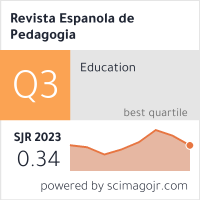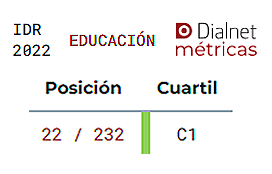¿Cabe una educación sexual que sea expresión de una inteligencia cultivada?
DOI
10.22550/REP79-1-2021-05
Abstract
This article aims to show how sex education today responds to the dominance that philosophies of suspicion have achieved over intellectual life, a dominance that hinders a normative judgment of human sexuality. Any attempt at regulation is suspected of concealing some kind of domination by some over others. The lack of regulations makes meaningful education about sexuality impossible and only allows for education that is superficial, instrumental, and limits itself to managing unwanted consequences such as teenage pregnancies and sexually transmitted infections. This work shows that there is another way of understanding intellectual life that is linked to moral life, open to the truth, and not just dedicated to denunciation. Thinking well involves living within a tradition and on the path of a good life. A concept of a good life supposes a teleological understanding of the human condition and the necessary cultivation of virtues in order to remain within it. In this dimension, sexuality has a meaning that is not merely biological but also relational, generative, and communicative, and it is subject to rules that derive from our personal character and sexuality’s relationship with intimacy.
Referencias | References
Barkow, J. H., Cosmides, L., & Tooby, J. (Eds.) (1992). The adapted mind: Evolutionary psychology and the generation of culture. Oxford University Press.
Bloom, A. (2008). The closing of the American mind. Simon and Schuster.
Brandon, M. (2016). Monogamy and nonmonogamy: Evolutionary considerations andtreatment challenges. Sexual medicine reviews, 4 (4), 343-352. 10.1016/j. sxmr.2016.05.005
Carter, J., & Duncan, S. (2017). Wedding paradoxes: Individualized conformity and the ‘perfect day’. The sociological review, 65 (1), 3-20. 10.1111/1467-954X.12366
Chesterton, G. K. (2005). Questions of divorce. New England Review (1990-), 26 (1), 174-178. Choza, J. (1990). La supresión del pudor y otros ensayos [The elimination of embarrassment and other essays]. EUNSA.
Choza, J. (2020). El sexo de los ángeles. Sexo y género desde las bacterias a los robots [The sex of the angels. Sex and gender from bacteria to robots]. Editorial Thémata.
Collins, C., Alagiri, P., Summers, T., & Morin, S. F. (2002). Abstinence only vs. comprehensive sex education: What are the arguments. What is the evidence. AIDS Research Institute, University of California. https://bit.ly/2JAOtHV
Earp, B. D., & Savulescu, J. (2020). Evolved fragility. In Love is the drug (pp. 101-109). Manchester University Press.
Eberstadt, M. (2019). Primal screams: How the sexual revolution created identity politics. Templeton Foundation Press.
Fine, M., & McClelland, S. (2006). Sexuality education and desire: Still missing after all these years. Harvard Educational Review, 76 (3), 297-338. 10.17763/haer.76.3.w5042g23122n6703
Fine, M. (1988). Sexuality, schooling, and adolescent females: The missing discourse of desire. Harvard Educational Review, 58 (1), 29-54. https:// doi.org/10.17763/haer.58.1.u0468k1v2n2n8242
Giroux, H. (2013). Critical pedagogy in dark times. Praxis Educativa, 17 (2), 27-38.
Hadjadj, F. (2010). La profundidad de los sexos. Por una mística de la carne [The depth of the sexes. For a mystique of the flesh. Nuevo Inicio.
Haidt, J. (2013). Moral psychology for the twenty-first century. Journal of Moral Education, 42 (3), 281-297. 10.1080/03057240.2013.817327
Harden, K. P. (2014). A sex-positive framework for research on adolescent sexuality. Perspectives on Psychological Science, 9 (5), 455-469. https://doi.org/10.1177/1745691614535934
Immordino-Yang, M. H., Darling-Hammond, L., & Krone, C. R. (2019). Nurturing nature: How brain development is inherently social and emotional, and what this means for education. Educational Psychologist, 54 (3), 185-204. https://doi.org/10.1080/00461520.2019.1633924
Irvine, J. M. (2004). Talk about sex: The battles over sex education in the United States. University of California Press.
MacIntyre, A. (1999). Dependent rational animals: Why human beings need the virtues. Open Court Publishing.
Pieper, J. (2011). Guide to Thomas Aquinas. Ignatius Press. https://amzn.to/33B7yks
Reyero D. (2020). Teoría mimética y educación sexual. Contra los géneros en conflict Mimetic theory and sexual education. Against conflictual gender. Xiphias Gladius. Revista Interdisciplinar De Teoría Mimética, 3. https://doi.org/10.32466/eufvxg.2020.3.635.121-138
Reyero, D., & Gil Cantero, F. (2019). La educación que limita es la que libera | Education that limits is education that frees. revista española de pedagogía, 77 (273), 213-228. https://doi.org/10.22550/REP77-2-2019-01
Rorty, R. (1989). Education without dogma: Truth, freedom, & our universities. Dissent, 36, 198-204. Santelli, J. S., Kantor, L. M., Grilo, S. A., Speizer, S., Lindberg, L. D., Heitel, J., Schalet, A. T., Lyon, M. E., Mason-Jones, A. J., McGovern, T., Heck, C. J., Rogers, J., & Ott, M. A. (2017). Abstinence-only-until-marriage: An updated review of US policies and programs and their impact. Journal of Adolescent Health, 61 (3), 273-280.
Scruton, R. (2006). Sexual desire: A philosophical investigation. Continuum.
Scruton, R. (2009). I drink therefore I am: A philosopher’s guide to wine. A&C Black.
Scruton, R. (2019). On human nature. Princeton University Press.
Symons, D. (1989). A critique of Darwinian anthropology. Ethology and Sociobiology, 10 (1-3), 131-144. 10.1016/0162-3095(89)90016-2
Spaemann, R. (2003). ¿Es la emancipación un objetivo de la educación? [Is emancipation an aim of education?] In Límites. Acerca de la dimensión ética del actuar (pp.453-465). EIUNSA, Spaemann, R. (2017). Prólogo a la edición alemana [Foreword to the German edition]. In G. Kuby (2017), La revolución sexual global. La destrucción de la libertad en nombre de la libertad ( pp. 27-29). Didaskalos.
Susman, E. J., Marceau, K., Dockray, S., & Ram, N. (2019). Interdisciplinary work is essential for research on puberty: Complexity and dynamism in action. Journal of Research on Adolescence, 29 (1), 115-132. 10.1111/jora.12420
Tolman, D. L. (2012). Female adolescents, sexual empowerment and desire: A missing discourse of gender inequity. Sex Roles, 66, 746-757. https://doi.org/10.1007/s11199-012-0122-x
Tolman, D. L., & McClelland, S. I. (2011). Normative sexuality development in adolescence: A decade in review, 2000–2009. Journal of Research on Adolescence, 21 (1), 242-255. https://doi.org/10.1111/j.1532-7795.2010.00726.x
Wilson, E. O (2000). Sociobiology: The new synthesis. Harvard University Press Yela, M. (1996). Comportamiento animal y conducta humana [Animal behaviour and human conduct]. Psicothema, 8 (Sup), 149-163.
Citación recomendada | Recommended citation
García, D. R.
(2021)
.
Is there a sexual education that is an expression of a cultivated intelligence?.
Revista Española de Pedagogía, 79(278).
https://doi.org/10.22550/REP79-1-2021-05
Licencia Creative Commons | Creative Commons License
Esta obra está bajo una licencia internacional Creative Commons Atribución-NoComercial 4.0.
This work is licensed under a Creative Commons Attribution-NonCommercial 4.0 International License








